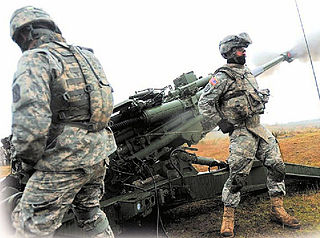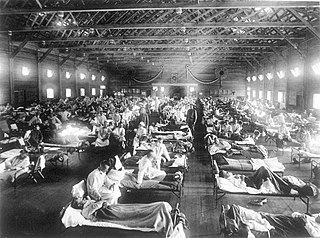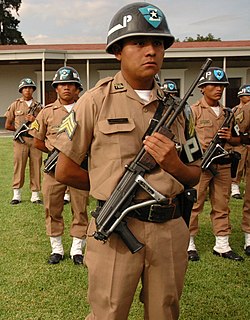Related Research Articles

Fort Lewis was a United States Army post from 1917 to 2010 located 9.1 miles (14.6 km) south-southwest of Tacoma, Washington. Fort Lewis was merged with McChord Air Force Base on February 1, 2010 to form Joint Base Lewis–McChord.

Military police (MP) are law enforcement agencies connected with, or part of, the military of a state.

The United States Disciplinary Barracks (USDB) colloquially known as Leavenworth, is a military correctional facility located on Fort Leavenworth, a United States Army post in Kansas.
Steven Anthony Stefanowicz was involved, as a private contractor for CACI International, in the interrogations at Abu Ghraib prison in Iraq.

Provost marshal is a title given to a person in charge of a group of Military Police (MP). The title originated with an older term for MPs, provosts, from the Old French prévost. While a provost marshal is now usually a senior commissioned officer, s/he may be a person of any rank, who commands any number of MPs; historically, the title was sometimes applied to civilian officials, especially under conditions of martial law, or when a military force had day-to-day responsibility for some or all aspects of civilian law enforcement. A provost marshal may also oversee security services, imprisonment, fire/emergency services and ambulances.
A military prison is a prison operated by a military. Military prisons are used variously to house prisoners of war, unlawful combatants, those whose freedom is deemed a national security risk by the military or national authorities, and members of the military found guilty of a serious crime. Thus, military prisons are of two types: penal, for punishing and attempting to reform members of the military who have committed an offense, and confinement-oriented, where captured enemy combatants are confined for military reasons until hostilities cease.
Elmira Correctional Facility, also known as "The Hill," is a maximum security state prison located in Chemung County, New York, in the City of Elmira. It is operated by the New York State Department of Corrections and Community Supervision. The supermax prison, Southport Correctional Facility, is located two miles away from Elmira.

The Fay Report, officially titled Investigation of Intelligence Activities at Abu Ghraib, was a military investigation into the torture and abuse of prisoners at the Abu Ghraib prison in Iraq. It was sparked by leaked images of Iraqi prisoners, hooded and naked, being mistreated obtained by the United States and global media in April 2004. The Fay Report was one of five such investigations ordered by the military and was the third to be submitted, as it was completed and released on August 25, 2004. Prior to the report's release, seven reservist military police had already been charged for their roles in the abuse at the prison, and so the report examined the role of military intelligence, specifically the 205th Military Intelligence Brigade that was responsible for the interrogation of prisoners at Abu Ghraib. General Paul J. Kern was the appointing authority for the report and oversaw the investigation. The chief investigators were Major General George Fay, whom the report is named after, and Lieutenant General Anthony R. Jones.

Portsmouth Naval Prison is a former U.S. Navy and Marine Corps prison on the grounds of the Portsmouth Naval Shipyard (PNS) in Kittery, Maine. The building has the appearance of a castle. The reinforced concrete naval prison was occupied from 1908 until 1974.

Law enforcement in Bolivia is reliant on the 40,000-member Cuerpo de Policía Nacional responsible for internal security and maintaining law and order. Unlike many South American countries, the Bolivian police force always has been accountable to the national government rather than to state or local officials. The 1950 Organic Law of Police and Carabiniers officially separated the police from the military. Frequently, however, the national police call upon the military for assistance in quelling riots and civil protests.
Marine Corps Brig, Quantico was a Level I facility military prison operated at Marine Corps Base Quantico in Quantico, Virginia from 1972 until December 31, 2011. The building was located in eastern Stafford County, south of the base headquarters.

Camp Funston was a U.S. Army training camp located on Fort Riley, southwest of Manhattan, Kansas. The camp was named for Brigadier General Frederick Funston (1865–1917). It was one of sixteen such camps established at the outbreak of World War I.

Naval Consolidated Brig, Miramar (NAVCONBRIG) is a military prison operated by the U.S. Navy at Marine Corps Air Station Miramar in Miramar, San Diego, California, just under 10 miles (16 km) north of downtown San Diego. It is one of three Navy consolidated brigs and is the Pacific area regional confinement facility for the United States Department of Defense. It is also known as the Joint Regional Correctional Facility Southwest. The 208,000-square-foot (19,300 m2) facility has a capacity of up to 400 male and/or female prisoners and is staffed with 31 civilian and 173 military personnel. It is about 1.5 miles (2.4 km) from the MCAS Miramar East Gate Entrance.

Provosts are military police whose duties are policing solely within the armed forces of a country, as opposed to gendarmerie duties in the civilian population. However, many countries use their gendarmerie for provost duties.

The George Jackson Brigade was a revolutionary group founded in the mid-1970s, based in Seattle, Washington, and named after George Jackson, a dissident prisoner and Black Panther member shot and killed during an alleged escape attempt at San Quentin Prison in 1971. The group combined veterans of the women's liberation movement, homosexuals and Black prisoners.

The New Bilibid Prison (NBP) in Muntinlupa, Metro Manila is the main insular penitentiary designed to house the prison population of the Philippines. It is maintained by the Bureau of Corrections (BuCor) under the Department of Justice. As of November 2021, the NBP housed 28,545 inmates, which exceeds its ideal capacity of 6,435.

A prison, also known as a jail or gaol, penitentiary, detention center, correction center, correctional facility, lock-up or remand center, is a facility in which inmates are confined and denied a variety of freedoms under the authority of the state as punishment for various crimes. Prisons are most commonly used within a criminal justice system: people charged with crimes may be imprisoned until their trial; those pleading or being found guilty of crimes at trial may be sentenced to a specified period of imprisonment. In simplest terms, a prison can also be described as a building in which people are legally held as a punishment for a crime they have committed.
The United States Army Corrections Command (ACC) exercises command and control and operational oversight for policy, programming, resourcing, and support of Army Corrections System (ACS) facilities and TDA elements worldwide.

The Maywand District murders were the murders of at least three Afghan civilians perpetrated by a group of U.S. Army soldiers from June 2009 to June 2010, during the War in Afghanistan. The soldiers, who referred to themselves as the "Kill Team", were members of the 3rd Platoon, Bravo Company, 2nd Battalion, 1st Infantry Regiment, and 5th Brigade, 2nd Infantry Division. They were based at FOB Ramrod in Maiwand, from Kandahar Province of Afghanistan.
Penal military units, including penal battalions, penal companies, etc., are military formations consisting of convicts mobilized for military service. Such formations may contain soldiers convicted of offenses under military law, persons enrolled in the unit after being convicted in civilian courts or some combination of the two. Service in such units is typically considered a form of punishment or discipline in lieu of imprisonment or capital punishment.
References
- Department of the Army Pamphlet 27-173 (31 Dec 92), p. 373
- The U.S. Army Correctional Activity, 8 Feb. 88 (prepared for the USJA, U.S. Army Correctional Brigade, formerly the U.S. Army Correctional Activity)